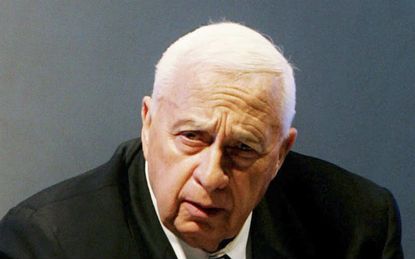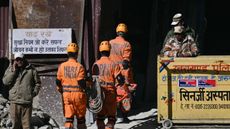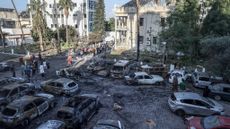Ariel Sharon: a time to eulogise or to face the brutal facts?
As Sharon's death is announced from Tel Aviv, young Israelis look to the future not the past

THAT an Israeli politician, indirectly responsible for the massacre in 1982 of hundreds of Palestinian and Lebanese civilians, should get near rolling coverage of his deteriorating health and eventual death similar to that afforded to Nelson Mandela is not surprising - if one looks at who has been doing the reporting.
The eulogies and appraisals published by the American, British and Israeli media for Ariel Sharon, the man who went from a teenage member of Haganah (the paramilitary force that preceded the Israeli army) to prime minister (2001-2006), are heavy on the word "legacy" and seem intent on weighing the man's actions to determine whether he was, overall, a force for peace or war.
His more than 65 years in the service of Israel, both on the battlefield and in the Knesset, leave plenty to be picked over.
Subscribe to The Week
Escape your echo chamber. Get the facts behind the news, plus analysis from multiple perspectives.

Sign up for The Week's Free Newsletters
From our morning news briefing to a weekly Good News Newsletter, get the best of The Week delivered directly to your inbox.
From our morning news briefing to a weekly Good News Newsletter, get the best of The Week delivered directly to your inbox.
Inevitably, much has been made of his final contribution to Israel's history - his decision in 2005, four years into his premiership, to forcibly remove nearly 10,000 illegal Israeli settlers from the Gaza Strip.
Framed as a "shock" move in light of his previous hawkishness, the decision to be rid - on his own terms - of a stretch of land that would never be part of Israel actually fitted perfectly with his lifelong aim to strengthen his country.
But this final political act, less than six months before he suffered the stroke that would put him in a coma for eight years, has been turned into something more: an exaggerated glimpse of what might have been.
Numerous commentators have suggested that the Gaza withdrawal was the start of a new direction, that Sharon, aka the Bulldozer, was in the process of developing a more flexible, pragmatic face for Israel. What might he have gone on to achieve? We will never know, and never can.
Such speculation, which serves only to further lionise the so-called 'Lion of God' (even in his final hours, hospital bulletins talked of him "fighting like a lion"), should not form part of his final weighing. We have more than enough facts to go on.
During his short tenure as Defence Minister, he oversaw the 1982 invasion of Lebanon and was held indirectly responsible – by an Israeli commission of inquiry - for "not taking appropriate measures to prevent bloodshed" when Lebanese Christian Phalangist forces entered the Sabra and Shatila refugee camps in Beirut and massacred thousands of Palestinians and Lebanese Shiites.
To Sharon's fury, the commission demanded his resignation; it took the death of a protester at a Peace Now march to make him stand down.
And despite his eventual about-turn on the issue of Israel’s presence in Gaza, he is inextricably linked to the birth of the Israeli settlement movement in the 1970s and 80s.
During his tenure as Minister of Agriculture (1977-81) under the premiership of Menachem Begin, Sharon was a forceful proponent of the right-wing Gush Enumin's activities as it sought - regardless of legality - to install Jewish people in the occupied Palestinian territories, land they believed God had given them.
Even his much-heralded military career has its stains. As the 25-year-old commander of the special forces Unit 101, he led a “reprisal” attack on Qibya village in October 1953. A UN Security Council document on the incident reports: “All occupants of dwellings had been murdered at close range. In all, there were 66 innocent victims, most of them women and children.”
In Israel, of course, most of these facts are well known. Yet with the non-stop Western media coverage of his deathbed bulletins, you'd be forgiven for assuming that Sharon and his legacy have been the dominant topics of conversation among Israelis in recent weeks. However, this is another western distortion: the extent to which his death will resonate in Israel.
Chatting online with young friends in Israel, all admitted they had followed the news of his deteriorating health, but said they had no particular thoughts on either the man or his demise after eight years in a vegetative state.
"No one really cares, it's only the media," Omer, an Israeli in his early 20s, told me a few days before his death was announced on Saturday. "When I open the paper, it's everywhere, but when I open my Facebook, there is nothing. Just a few jokes about why he is even still alive."
"And I don't think it's even just the younger generation, a lot of the older ones too. Even my parents don't care."
Even lions cannot roar from beyond the grave.
Create an account with the same email registered to your subscription to unlock access.
Sign up for Today's Best Articles in your inbox
A free daily email with the biggest news stories of the day – and the best features from TheWeek.com
Venetia Rainey is a Middle East correspondent for TheWeek.co.uk based in Lebanon where she works for the national English-language paper, The Daily Star. Follow her on Twitter @venetiarainey.
-
 'Republicans want to silence Israel's opponents'
'Republicans want to silence Israel's opponents'Instant Opinion Opinion, comment and editorials of the day
By Harold Maass, The Week US Published
-
 Poland, Germany nab alleged anti-Ukraine spies
Poland, Germany nab alleged anti-Ukraine spiesSpeed Read A man was arrested over a supposed Russian plot to kill Ukrainian President Zelenskyy
By Peter Weber, The Week US Published
-
 Today's political cartoons - April 19, 2024
Today's political cartoons - April 19, 2024Cartoons Friday's cartoons - priority delivery, USPS on fire, and more
By The Week US Published
-
 Puffed rice and yoga: inside the collapsed tunnel where Indian workers await rescue
Puffed rice and yoga: inside the collapsed tunnel where Indian workers await rescueSpeed Read Workers trapped in collapsed tunnel are suffering from dysentery and anxiety over their rescue
By Sorcha Bradley, The Week UK Published
-
 Gaza hospital blast: What the video evidence shows about who's to blame
Gaza hospital blast: What the video evidence shows about who's to blameSpeed Read Nobody wants to take responsibility for the deadly explosion in the courtyard of Gaza's al-Ahli Hospital. Roll the tape.
By Peter Weber, The Week US Published
-
 Giraffe poo seized after woman wanted to use it to make a necklace
Giraffe poo seized after woman wanted to use it to make a necklaceTall Tales And other stories from the stranger side of life
By Chas Newkey-Burden, The Week UK Published
-
 Helicopter sound arouses crocodiles
Helicopter sound arouses crocodilesTall Tales And other stories from the stranger side of life
By Chas Newkey-Burden, The Week UK Published
-
 Woman sues Disney over 'injurious wedgie'
Woman sues Disney over 'injurious wedgie'Tall Tales And other stories from the stranger side of life
By Chas Newkey-Burden, The Week UK Published
-
 Emotional support alligator turned away from baseball stadium
Emotional support alligator turned away from baseball stadiumTall Tales And other stories from the stranger side of life
By Chas Newkey-Burden, The Week UK Published
-
 Europe's oldest shoes found in Spanish caves
Europe's oldest shoes found in Spanish cavesTall Tales And other stories from the stranger side of life
By Chas Newkey-Burden, The Week UK Published
-
 Artworks stolen by Nazis returned to heirs of cabaret performer
Artworks stolen by Nazis returned to heirs of cabaret performerIt wasn't all bad Good news stories from the past seven days
By The Week Staff Published